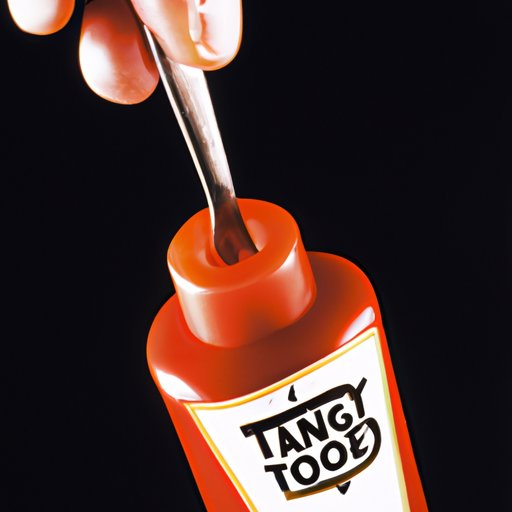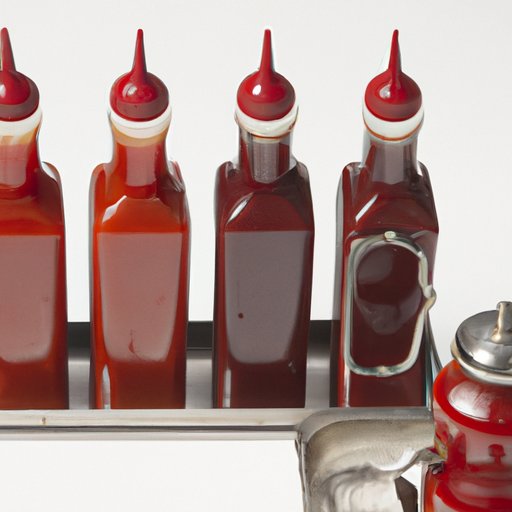Introduction
Ketchup is an iconic condiment that has been enjoyed by people all over the world for centuries. It’s a staple in many households, adding flavor and spice to countless meals. But have you ever stopped to wonder how ketchup was invented?
Ketchup is a thick, tomato-based sauce that can be used as a condiment or a cooking ingredient. It’s made with tomatoes, vinegar, sugar, salt, and various spices. The exact ingredients and recipe vary depending on the brand and type of ketchup.
In this article, we’ll explore the origins of ketchup and take a look at how it has evolved over time. We’ll also investigate who invented ketchup and when.
A Historical Look at the Invention of Ketchup
Tracing the Origins of Ketchup: From Sea Captains to Bottled Sauce
The origin of ketchup is widely debated, but most historians agree that its roots can be traced back to the early 1700s. At this time, sea captains and sailors were bringing back fish sauces from Southeast Asia. These sauces were made with fermented fish, spices, and other ingredients, and they were used as a condiment or a marinade.
By the late 1700s, these fish sauces had become popular in Britain. However, they were expensive and hard to come by, so cooks began experimenting with alternative ingredients. One of the most popular substitutes was tomatoes, which were abundant in North America. Recipes for “tomato ketchup” began popping up in cookbooks in the early 1800s.
By the mid-1800s, ketchup had become a popular condiment in the United States. It was sold in glass bottles, and recipes for homemade versions were featured in newspapers and magazines. Ketchup was even used as a medicine during this time, as some believed it had healing properties.
Exploring the Evolution of Ketchup Through Time
Ketchup has changed significantly since it first appeared in the 1800s. For example, early recipes were quite different from the ketchup we know today. They often included ingredients like mushrooms, walnuts, oysters, and anchovies, and they weren’t always tomato-based.
As industrialization took off in the late 1800s, food production became more efficient and ketchup could be mass-produced. This led to the introduction of new ingredients such as corn syrup and preservatives. By the early 1900s, ketchup had become a staple in American households.
Today, ketchup is still a popular condiment, but it has evolved to meet changing tastes. Many brands now offer low-sugar, low-sodium, and organic varieties, as well as specialty flavors like sriracha, chipotle, and garlic.

How Ketchup Changed the Way We Eat
Impact on Food Industry
Ketchup has had a major impact on the food industry. According to a study by the Harvard Business Review, ketchup sales in the US reached $1 billion in 2009, making it one of the most popular condiments in the country. The same study found that ketchup consumption has grown steadily since the 1970s, and it continues to be a top seller in supermarkets and restaurants.
Ketchup has also had a major influence on the restaurant industry. It’s often used as a dipping sauce for French fries and other fried foods, as well as a topping for hamburgers and hot dogs. Many restaurants have created their own signature ketchups and sauces, and some even offer gourmet varieties.
Popularity of Ketchup as Condiment
Ketchup’s popularity isn’t limited to the United States. It’s a beloved condiment all over the world, especially in countries like Canada, the UK, Mexico, and Germany. According to a survey by the International Condiment Association, ketchup is the most popular condiment in the world, with an estimated 80 percent of households in the US having at least one bottle in their refrigerator.
Ketchup’s popularity can be attributed to its versatility and convenience. It’s easy to use, it goes with almost any food, and it adds flavor without overpowering the dish. Plus, it’s relatively inexpensive, making it a budget-friendly option for families.
The Surprising History Behind Ketchup: Who Invented It and When?
Who Invented Ketchup?
The exact inventor of ketchup is unknown, but there are a few theories. Some believe that ketchup was invented by Chinese traders, while others think it was created by British sailors. Still others believe that ketchup originated in the United States.
In fact, ketchup was likely invented by multiple people over a period of time. As the popularity of tomatoes grew in the 18th century, cooks experimented with different recipes to make the most flavorful sauce. Eventually, these recipes evolved into the ketchup we know today.
When Was Ketchup Invented?
The exact date when ketchup was invented is unknown, but historians believe it was sometime in the early 1800s. The first known recipe for tomato ketchup appeared in an American cookbook in 1812, but it’s likely that it had been around for some time before that.
Ketchup didn’t become popular until the late 1800s, when it was mass-produced and sold in glass bottles. By the early 1900s, it had become a staple in American households.
Conclusion
Summary of Findings
Ketchup is a beloved condiment that has been enjoyed by people all over the world for centuries. Its origins can be traced back to the early 1700s, when sea captains and sailors brought back fish sauces from Southeast Asia. Over time, cooks began experimenting with different ingredients, eventually creating the ketchup we know today.
Ketchup has had a major impact on the food industry, becoming one of the most popular condiments in the US. It’s also a favorite in many countries around the world, thanks to its versatility and convenience. Finally, the exact inventor of ketchup is unknown, but it’s likely that it was invented by multiple people over a period of time.
Final Thoughts on Ketchup’s Place in History
Ketchup is an iconic condiment that has been a part of our lives for centuries. It has evolved over time, adapting to changing tastes and preferences. While the exact inventor of ketchup is unknown, it’s clear that it has had a major influence on the way we eat.
So the next time you reach for the ketchup, take a moment to reflect on its remarkable history. Who knows—you may just discover a newfound appreciation for this beloved condiment.
(Note: Is this article not meeting your expectations? Do you have knowledge or insights to share? Unlock new opportunities and expand your reach by joining our authors team. Click Registration to join us and share your expertise with our readers.)
